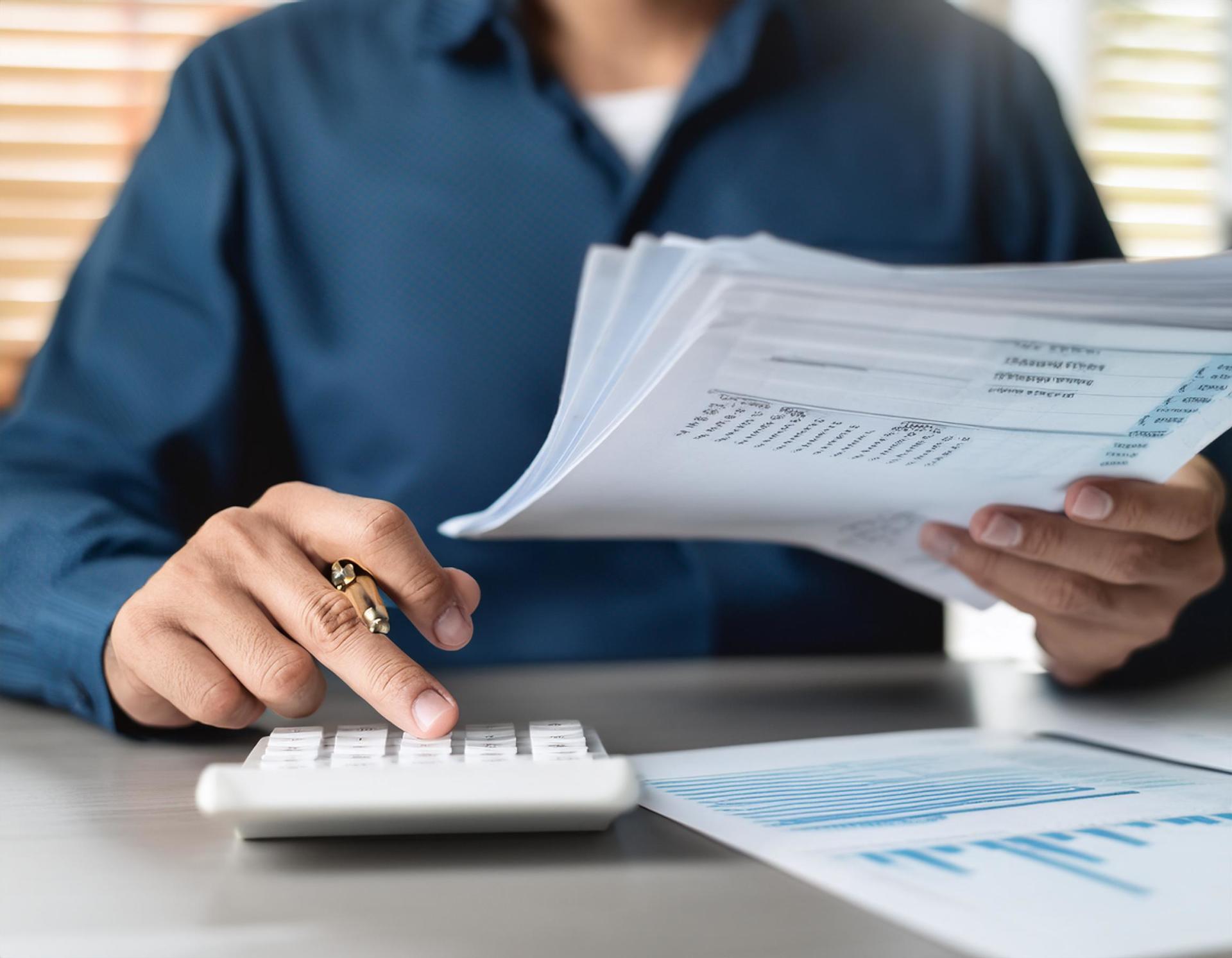

VAT, or Value Added Tax, is a tax added to most goods and services sold by businesses registered for VAT. It's a bit like a sales tax. When you buy something, you pay VAT to the shop, and then the shop passes that money to the government.
If your business earns more than £90,000 a year, you must register for VAT. However, even if you earn less, you can still choose to register. But why would you pay if you don't have to?
It's a fair question with a fairly straightforward answer: The benefits of being VAT-registered can sometimes outweigh the drawbacks. But this wholly depends on a business's specific situation.
Still scratching your head and wondering what on earth the benefits of being VAT registered are? In this article, we'll walk you through the key advantages, helping you decide if it's the right move for your business.
Table of Contents
- What is VAT?
- What are the benefits of being VAT-registered?
- Example of the benefits of VAT registration
- What impact can VAT registration have on business operations?
- What to consider before registering for VAT
- What is the VAT threshold for mandatory registration?
- How does being VAT registered affect pricing and competitiveness?
- Can you deregister for voluntary VAT?
- How do you voluntarily register for VAT?
- Conclusion
What is VAT?
VAT is a key part of the UK's tax system. There are three rates of VAT:
The standard rate of 20%
A reduced rate of 5%
A zero rate of 5%.
Most things you buy are taxed at the standard rate, while some things like energy are charged at a reduced rate.
VAT is important because it generates a lot of income for the country and is generally simpler to handle than income tax. In fact, VAT contributes about 6.2% to the UK's GDP, which is the total value of all goods and services produced. In the 2018-19 tax year, VAT was the third biggest source of income for the government.
What are the benefits of being VAT-registered?
There are several benefits to business being VAT registered. We explore them in detail below.
Reclaim VAT on business expenses
When your business is VAT registered, you can reclaim the VAT paid on goods and services purchased for your business. This can significantly reduce your overall costs, especially if you have substantial business expenses. For example, if you buy office supplies or equipment, the VAT you pay can be reclaimed, which helps improve your cash flow and reduces operational costs.
Enhanced business credibility
Being VAT-registered can enhance your business's credibility and professionalism. It signals to customers, suppliers, and partners that your business is well-established and compliant with tax regulations.
This can be particularly beneficial when dealing with larger companies that prefer or require their partners to be VAT-registered.
Competitive edge
VAT registration allows your business to appear more substantial and reliable. Many businesses and consumers view VAT registration as a sign of legitimacy.
Additionally, being VAT-registered can open up more business opportunities, as some companies prefer or exclusively deal with VAT-registered suppliers.
International trade
VAT registration can simplify international trade by providing access to special customs arrangements and reducing delays at customs checkpoints. This makes exporting and importing goods more efficient and can help your business expand into new markets more smoothly.
Better cash flow management
By reclaiming VAT on purchases, your business can better manage its cash flow. The ability to offset the VAT you pay on purchases against the VAT you charge on sales means that you are only paying the difference to HMRC.
This can be particularly beneficial if your business often pays more VAT on expenses than it collects from sales.
Example of the benefits of VAT registration
Fictional small business Creative Prints sells custom-printed t-shirts and is not VAT registered.
They buy blank t-shirts from a supplier for £10 each (including VAT) and sell the custom t-shirts for £20 each to customers. However, because they aren't VAT registered, they pay VAT on business expenses (like blank t-shirts) but can't reclaim it because they're not VAT registered.
Creative Prints competitor, T-Shirt Bros, is VAT registered. They also buy blank t-shirts from a supplier for £10 each and sell them for £20 plus VAT. Therefore the total price charged to the customer is £24 (£20 + £4 VAT).
Because they are VAT registered, T-Shirt Bros can:
Reclaim VAT on their purchases, reducing overall costs;
Remain competitive in their selling price, as VAT-registered business customers can reclaim the £4 from HMRC, so the effective cost to them is still £20.
Benefits like this can make VAT registration advantageous for many businesses, even those not legally required to register. However, it's important to weigh these benefits against the administrative burden and potential impact on your pricing to determine if VAT registration is right for your business.
What impact can VAT registration have on business operations?
If your business is VAT registered, you'll need to charge VAT to your customers, which could make your goods and services up to 20% more expensive. However, this also opens up the opportunity to join VAT schemes that can simplify how you handle VAT with HMRC.
These schemes are optional, so it's important to consider whether joining one is beneficial for your business and to choose the right one. Here are some options:
VAT Flat Rate Scheme
Designed for small businesses with an annual taxable turnover of £150,000 or less (excluding VAT), the VAT Flat Rate Scheme lets you calculate VAT as a percentage of your gross turnover. The specific percentage depends on your industry.
VAT Annual Accounting Scheme
If your business has an annual turnover of £1.35 million or less, you can opt to make just one VAT return a year instead of the usual four with the VAT Annual Accounting Scheme.
VAT Cash Accounting Scheme
Under the VAT Cash Accounting Scheme, you pay VAT to HMRC when your customers pay you, rather than when you invoice them. This can help with cash flow management.
VAT Margin Scheme
Ideal for retail businesses and sellers of second-hand goods, the VAT Margin Scheme allows you to pay VAT on the profit margin of the items you sell, rather than on the full selling price.
What to consider before registering for VAT
While there are benefits to registering for VAT, it's important to be aware of potential drawbacks.
Here are some key points to think about before you decide:
Charging VAT
Once registered, you'll need to charge the correct VAT rate on your products or services. This means keeping accurate records of how much VAT you collect from sales and how much you pay on business purchases.
Administrative duties
Being VAT registered comes with an administrative burden. You’ll need to maintain detailed records and regularly submit VAT returns. This can sometimes be overwhelming, disrupting your daily operations and pulling resources away from other important tasks.
VAT registration also means more paperwork. You'll need to keep VAT invoices and receipts, maintain detailed VAT accounting records, and file tax returns every quarter—unless you opt for the VAT Annual Accounting Scheme, which requires only one annual return.
To ensure your documentation is accurate and you comply with VAT regulations, you might need to hire an accountant. This adds another cost to your business but can be crucial for avoiding mistakes and penalties.
What is the VAT threshold for mandatory registration?
In the UK, the VAT threshold is currently set at £90,000. This means that if your business has a taxable turnover of less than £90,000, you are not required to register for VAT. However, you do have the option to register voluntarily if you feel it would benefit your business.
If you believe your business should have been registered for VAT in previous years, you can check the thresholds for those years on Gov.uk. This can help ensure you comply and avoid any potential issues.
How does being VAT registered affect pricing and competitiveness?
When you register for VAT, you need to add VAT to the prices of your goods or services. This addition can make your products more expensive for consumers who are not VAT-registered because they can't reclaim the VAT. For example, if you sell a product for £100, as a VAT-registered business, you'll need to charge £120.
To remain competitive, you might absorb the VAT cost instead of passing it fully onto customers. This means you would increase your prices by less than the VAT rate, reducing your profit margin.
However, if you primarily sell to other VAT-registered businesses, your competitiveness is less affected, as these businesses can reclaim the VAT, so the net cost to them remains the same.
Can you deregister for voluntary VAT?
You can voluntarily deregister if your taxable turnover in the next 12 months is expected to fall below the deregistration threshold, which is currently £88,000.
You can either deregister online through your VAT online account using your Government Gateway user ID and password or by completing form VAT7 and posting it to HMRC. The process typically takes about three weeks, and you must continue to charge VAT until your deregistration is confirmed.
Once deregistered, you must stop charging VAT on your sales and update your invoices accordingly. You also need to keep your VAT records for six years and submit a final VAT return covering the period up to your deregistration date.
How do you voluntarily register for VAT?
Most businesses can register for VAT online through the HMRC website. You'll need to create a Government Gateway account if you don't already have one. This account will be used to manage your VAT submissions and correspondence with HMRC.
During the registration process, you'll be asked to provide information including:
Business name and address
Business type (e.g. sole trader, limited company)
Unique Taxpayer Reference
Estimated annual turnover
Bank account details.
After submitting your application, HMRC will review it and, if everything is in order, you'll receive your VAT registration certificate and number. This typically takes about 30 working days.
Once you have your VAT number, you can start charging VAT on your goods and services and reclaim VAT on your business expenses.
Conclusion
Deciding whether to register for VAT is a significant decision for any business. While the benefits, such as reclaiming VAT on purchases, enhancing business credibility, and simplifying international trade, can be substantial, they must be weighed against potential drawbacks like increased administrative duties and higher prices for consumers.
For some businesses, especially those with high expenses or those dealing mainly with other VAT-registered businesses, the advantages may clearly outweigh the drawbacks. For others, particularly those with a large consumer base of non-VAT registered individuals, the decision might be more complex.
Ultimately, whether to register for VAT depends on your specific business needs and circumstances. By carefully considering both the benefits and challenges, you can make an informed decision that best supports your business's growth and compliance.
For more information on VAT registration, contact us today for the expert advice of our small business lawyers.